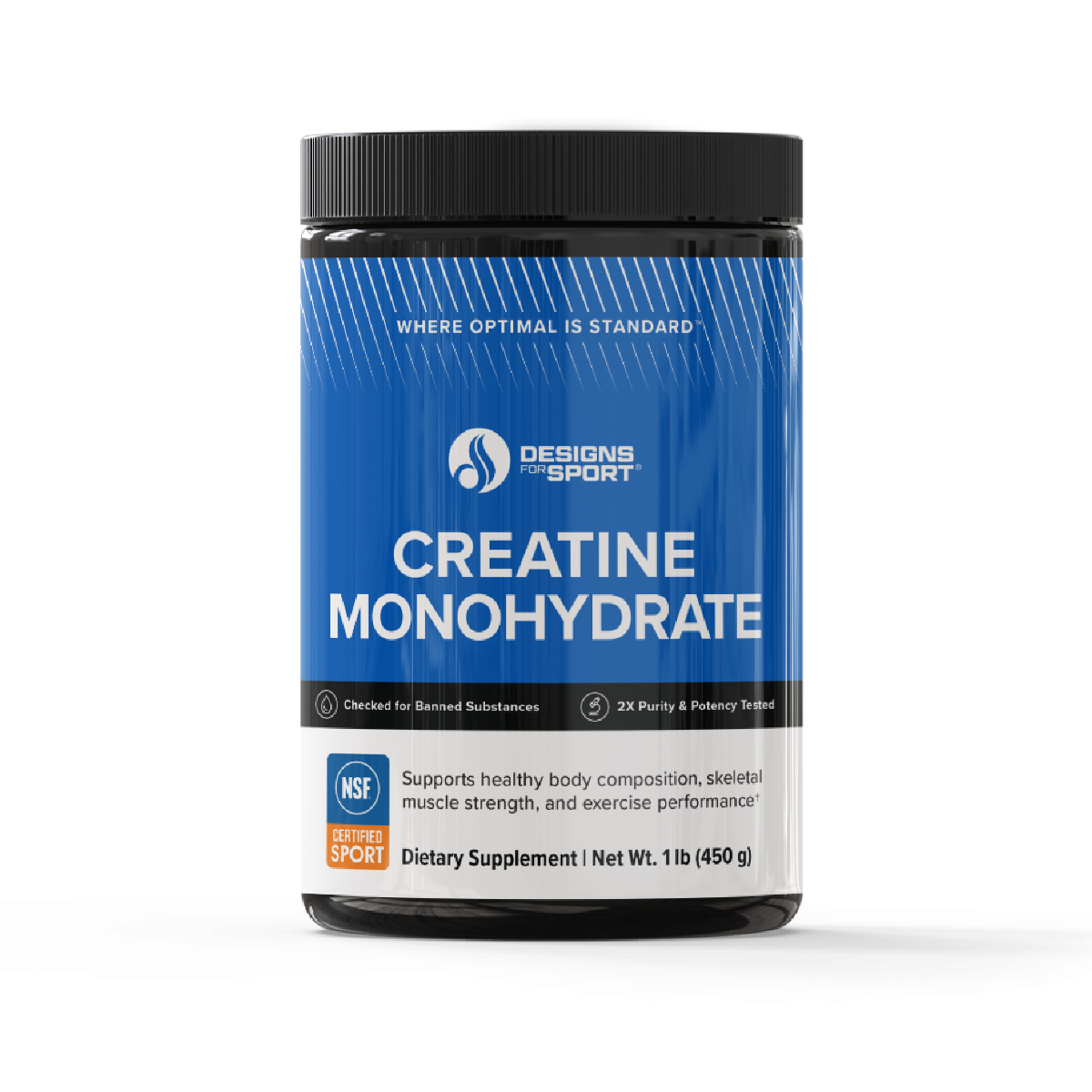Why is Creatine Good for Women?
Creatine has long been a staple in the fitness world, but its benefits extend far beyond the gym. Whether you're an athlete or simply looking to support your overall health, creatine is a supplement worth exploring.
What Is Creatine?
Creatine is a naturally occurring compound made from three amino acids—glycine, arginine, and methionine. It's produced in the liver, kidneys, and pancreas and stored primarily in muscle cells. Its main role? Helping your body produce energy during high-intensity, short-duration activities like sprinting or weightlifting. While creatine is found in foods like red meat and fish, supplementation can significantly boost your body’s creatine stores —especially helpful for vegetarians or those with lower dietary intake.
General Uses and Benefits
Creatine is widely used to:
- Increase muscle strength and power
- Enhance exercise performance
- Support faster recovery post-workout
- Improve lean muscle mass
- Aid in short bursts of energy for sports like sprinting, cycling, and weightlifting
But its benefits don’t stop at physical performance. Emerging research suggests creatine may also support brain health, reduce mental fatigue, and even help with mood regulation.
Creatine Benefits for Women
Historically marketed to men, creatine benefits are now gaining traction among women—and for good reason. Women typically have lower baseline creatine stores, making supplementation especially beneficial. Here’s how creatine can support women’s health:
- Hormonal support during menstrual cycles, pregnancy, and menopause
- Improved muscle tone and strength without unwanted bulk
- Enhanced cognitive function and mood stability
- Better bone density, especially in postmenopausal women
- Support during sleep deprivation and recovery from fatigue
Whether you're lifting weights, chasing toddlers, or navigating hormonal shifts, creatine can be a powerful ally in your wellness routine.
Benefits of Creatine for Women
Women naturally have lower baseline creatine stores—up to 70–80% less than men. This means supplementation can have a more pronounced effect, especially during times of hormonal fluctuation like menstruation, pregnancy, and menopause. Creatine supports the production of adenosine triphosphate (ATP), the body’s primary energy molecule. This is crucial not just for physical performance, but also for brain function, mood regulation, and cellular health.
Physical Benefits Tailored to Women
| Benefit | How It Helps Women |
| Muscle Strength & Tone | Enhances lean muscle mass without bulk; ideal for sculpting and toning |
| Exercise Performance | Improves endurance, recovery, and energy during workouts |
| Fat Reduction | Supports fat loss when combined with resistance training |
| Bone Density | Helps maintain bone strength, especially in postmenopausal women |
Creatine is especially effective when paired with resistance training, helping women build strength and preserve muscle mass as they age
Cognitive & Mood Support
Creatine isn’t just for the body—it’s a brain booster too. Women report improvements in:
- Short-term memory and processing speed
- Mood stability and reduced mental fatigue
- Executive function and reasoning skills
These benefits are particularly valuable during sleep deprivation, stress, or hormonal shifts, when cognitive performance tends to dip.
Hormonal Health & Life Stage Support
Creatine plays a unique role in supporting hormonal transitions:
- Menstrual Cycle: Helps regulate energy and mood during the luteal phase
- Pregnancy & Postpartum: Supports energy metabolism and may improve neonatal outcomes
-
Perimenopause & Menopause: Preserves muscle mass, bone density, and brain function
Women navigating midlife often experience brain fog, fatigue, and slower recovery—creatine can help buffer these changes and improve overall vitality.
Benefits of Creatine for Women over 50
Women over 50 face unique physiological changes due to menopause, hormonal shifts, and age-related muscle loss. Creatine for older adults can help counteract these effects in several key ways:
- Preserves Muscle Mass & Strength
- Improves Bone Density
- Boosts Brain Function & Mood
- Supports Hormonal Transitions
- Enhances Recovery & Energy
|
Designs For Sport - Creatine Monohydrate - 450g Essential for muscular contraction and cellular energy production, creatine supports muscle growth, endurance, and brain health. |
How Much Creatine Should Women Take?
The standard maintenance dose of creatine for most women is: 3–5 grams per day of creatine monohydrate. This amount is sufficient to maintain elevated creatine stores in the muscles and brain. Unlike men, women typically have lower baseline creatine levels, which means supplementation can have a more noticeable impact on energy, strength, and cognitive function.
Factors That Influence Dosage
Your ideal dose may vary based on:
- Body weight: Women under 120 lbs may benefit from 3g/day; those over 150 lbs may lean toward 5g/day
- Activity level: Highly active women or athletes may require the higher end of the dosage range
-
Dietary intake: Vegetarians or those with low meat consumption may benefit more from supplementation
Talk to Your GP or Healthcare Provider First - Before starting any supplement—including creatine—it’s important to consult with your GP or healthcare practitioner. Creatine is generally safe for healthy individuals, but personalised advice ensures it’s right for your body and lifestyle.
Creatine Side Effects for Women
Creatine is considered safe for healthy women when taken at recommended doses (typically 3–5g/day). It’s not a steroid, and it doesn’t cause hormonal imbalances or uncontrolled weight gain. However, like any supplement, it may cause mild side effects in some individuals.
| Side Effect | Description | Tips to Manage |
| Water Retention | Creatine draws water into muscle cells, which can lead to a temporary increase in weight or a “puffy” feeling | Skip the loading phase and stick to 3–5g/day to reduce bloating |
| Digestive Upset | Some women report mild stomach discomfort, nausea, or cramping, especially with high doses | Take creatine with meals and stay hydrated |
| Bloating | Most common during the loading phase (20g/day for 5–7 days) | Avoid loading; use a lower daily dose consistently |
| Weight Gain | Typically due to increased water in muscles—not fat gain | Understand it’s intramuscular water, which supports performance and recovery |
| Kidney Concerns | Creatine may raise blood creatinine levels, but this doesn’t mean kidney damage in healthy individuals | Consult your GP if you have pre-existing kidney issues or concerns |
The Best Creatine for Women
Supplement Hub is a trusted provider of high-quality nutritional supplements, offering a comprehensive range of vitamins, minerals and other essential nutrients to support a healthy lifestyle. If you are looking for Creatine supplements, Supplement Hub ensures that you get practitioner-approved products. With a commitment to quality and wellness, we provide carefully selected supplements that cater to various health needs, helping individuals maintain balanced nutrition and overall well-being.
We always recommend consulting with a healthcare professional before selecting the right creatine supplements for you.
|
Designs For Sport Workout Complex - 180g Featuring Peak ATP® (adenosine-5’-triphosphate), this blend supports strength, power, recovery, and combats exercise-induced fatigue. |






